Chamomile Tea
The white and yellow flowers of the chamomile plant have been popularly used over centuries, in both its fresh and dried forms, for preparing healthy herbal teas. Chamomile tea, sometimes spelt just as camomile tea, has a fresh, strong and sweet aromatic taste, being as refreshing a drink as it is beneficial, with the German and Italian variations of the herb being most popular for tea-making.
Chamomile tea history
The usage of the herb can be dated back hundreds of years with the ancient Egyptians having used it both as a cosmetic as well as a cure for ailments like cold and fever. Chamomile was also one of the principal ingredients in the embalming oil used to preserve deceased pharaohs.
The flowers were used for flavoring alcoholic as well as non-alcoholic beverages in countries like Rome and Spain. The herb has even been mentioned in the writings of Plinny the Elder.
Does chamomile tea have caffeine
Like most other herbal teas, chamomile tea does not contain any caffeine.
Chamomile tea benefits: what is it good for
Effects on the digestive system
It contains glycine, an amino acid responsible for its anti-spasmodic and anti-inflammatory properties that soothe the stomach and intestinal tract, helping in proper digestion, relieving nausea, gas, and bloating. As a result, chamomile is also considered to help with irregular bowel movements and constipation. It can help in balancing the stomach acid levels, preventing heartburn and acid reflux (GERD). Researches have also shown the herb to help with treating diarrhea, both in adults and young children. For these reasons, chamomile tea is often used by people suffering from irritable bowel syndrome or IBS.
Its antibacterial properties are believed to help in preventing the growth of Helicobacter pylori bacteria that causes stomach ulcers.
Migraine headaches
Chamomile has a relaxing effect on the central nervous system, making it beneficial for migraine headaches resulting from stress or tension. Its anti-inflammatory properties may also help in reducing the pain. So drinking a cup of the herbal tea every few hours may help to deal with the pain, especially in the early stages.
Anxiety and sleep problems
Its mild sedative properties may also help in fighting sleep disorders like insomnia by relieving anxiety and irritability. Taking a cup of warm tea 30-40 minutes before bed can promote a restful night’s sleep. Some studies even suggest its calming effects to be effective in stopping bad, vivid dreams.
Women’s health
The herb can work as an emmenagogue that stimulates the blood flow in the uterus and pelvic region, helping to regulate menstrual periods.
Studies have shown the glycine content to make the tea helpful for menstrual cramps, as it helps the uterine muscles to relax by preventing spasms.
Cancer prevention
Being one of the richest natural sources of anti-oxidants, it may help reduce the risk of developing cancer by fighting the negative effects of free radicals. Studies have also suggested the presence of certain other chemicals in the extracts that may slow down or prevent the growth of breast cancer and leukemia cells.
Type2 diabetes
Animal studies have produced promising results for the effects of chamomile tea in lowering blood glucose levels and fighting type 2 diabetes. You may reap the benefits by having a cup of the tea with meals every day. It helps by lowering the rate of glucose production from the starchy and sugary foods in your diet, making sure that a lesser amount of glucose is released into the blood. As a result, the tea can also help to reduce the risk of developing diabetes.
It also contains certain enzymes that can help manage and improve some of the symptoms and complications of type 2 diabetes, like vision loss, cataract as well as nerve and kidney damage.
Heart health
Certain blood thinning compounds in chamomile make the tea beneficial for overall cardiovascular health, as it helps to maintain healthy blood vessels, while promoting circulation. So, having a cup daily might reduce your chances of having a stroke or heart attack.
Effects on weight loss
Being a strong diuretic and detoxifier, it helps to flush out excess fluids from the body along with any toxins and waste materials, aiding in weight loss while helping to maintain proper kidney functioning. In addition to that, researches have shown it to be an effective appetite suppressant, making you feel full to prevent overeating when you have a cup before meals.
Cold and cough
Researches have linked the hippurate (a compound produced during the breakdown of tea flavonoids) present in the tea with considerable antibacterial properties. Regular intake of the tea has been shown to boost the immune system as well. A Journal of Agricultural and Food Chemistry study claimed the tea to be helpful for fighting infections related to cold, cough and sore throat.
Effects on skin
The antioxidants in it also contribute to better skin health by fighting common problems such as acne and dark circles while also reducing the signs of aging, such as wrinkles and fine lines.
Oral health
Drinking the warm, aromatic tea can help in soothing toothache, canker sores and gingivitis due to its antibacterial and anti-inflammatory properties.
Its anti-inflammatory, antibacterial and detoxifying properties contribute to other benefits including lowering the cholesterol levels, relieving joint pain and other symptoms of rheumatoid arthritis, improving the functioning of liver and gall bladder and reducing the risk of conditions like jaundice.
Other uses of chamomile tea
- The tea can be added to bath water to provide relief from irritation and itching resulting from skin conditions like eczema, chickenpox, Candida, psoriasis, acne and diaper rash; topical application of the used tea bags may also work for these conditions.
- When used topically, the anti-inflammatory properties of the tea can sooth wounds, burns and insect bites, accelerating the healing process.
- A chamomile bath can also be effective for dealing with a dry and flaky scalp and skin.
- It can be used as a homemade hair rinse for lightening golden-brown or blonde hair.
- A weak tea can be prepared to be used as eyewash for infectious conditions like conjunctivitis (pink eye) and blocked tear ducts.
- Rinsing the mouth with cold, mild tea can help get rid of odor and relieve problems like canker sores and swollen gums.
- Used tea bags can be applied on the eyes as a compress for relieving eye fatigue and lightening dark circles.
- The tea can be mixed along with other ingredients such as oatmeal or milk to prepare face masks for healthy skin.
- It can also be used as an enema to manage hemorrhoids.
How to make chamomile tea
Only the dried flower tops are used for preparing tea, the leaves and stems are not used for consumption due to their bitter taste.
- Take a cup of water in a saucepan and bring to boil
- As the water boils, add a heaping teaspoon of dry flowers and simmer the heat
- Let the saucepan sit on low heat for about 30 seconds before turning the heat off
- Now, cover the saucepan and let the tea brew until it has a pale yellow color
- Strain and serve the tea
- Add honey if you want your tea to have a sweet taste
You may also chill the drink for a couple of hours in the refrigerator and serve with ice cubes to get iced chamomile tea.
If you have fresh chamomile flowers, you can dry them in sunlight (or in the oven) and store them in a clean, dry, airtight jar for making tea. The dried flowers have a shelf life of 2-3months.
Is chamomile tea safe
During pregnancy
An occasional cup of tea is not considered to cause any harm during pregnancy, while its calming effects may help to relieve stress, sleeplessness and certain pains common during this time. However, overconsumption (e.g. 2-3 cups every day) is not recommended as it may cause a miscarriage or induce early labor.
While breastfeeding
Like in pregnant women, drinking a cup with a meal now and then is not likely to be harmful for the baby.
For babies, toddlers and older children
Chamomile tea is considered safe for children as its sedative properties have been shown to be too mild to cause any harm when taken occasionally. If fact, the relaxing effects of the herb on the stomach makes it a useful natural remedy for colic in infants. However, make sure to consult your pediatrician before using it for such purposes to avoid any risks.
Chamomile tea side effects
It does not generally have any side effect, even with regular consumption, unless you are allergic to plants from the sunflower family (e.g. dandelion, arnica, feverfew). Allergic reactions may include skin rashes or breathing problems. Overconsumption should be avoided.
As it has blood thinning as well as blood pressure and sugar lowering properties, it is recommended to avoid the tea if you are on blood thinners, BP or diabetes medications.
Where to buy chamomile tea
Fresh chamomile flowers are available at farmers’ markets and herb stores, where you can get them and dry them at home to make your own organic tea. It is also available in the dried tea form at local super markets, as well as online tea stores. Other flavored variations such as vanilla, lavender and citrus lemon chamomile teas are also available.
Article was last reviewed on 26th July 2021
Related Articles
Leave a Reply
One thought on “Chamomile Tea”
Leave a comment
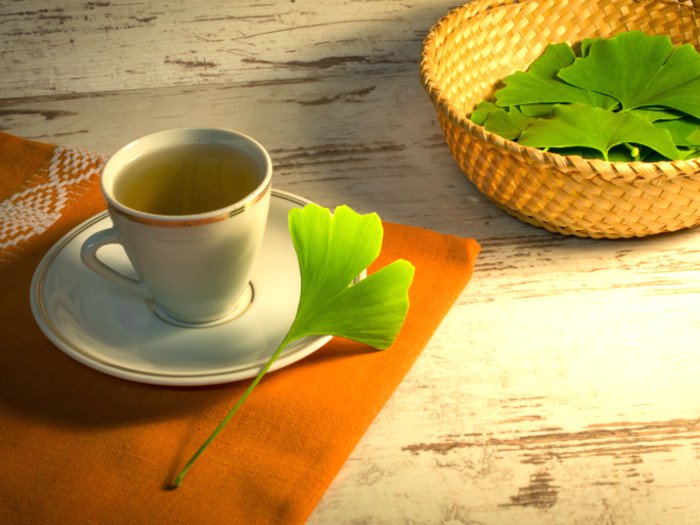
Ginkgo Biloba Tea
The Ginkgo Biloba tea is an herbal infusion obtained from the extract of the dried leaves
Read more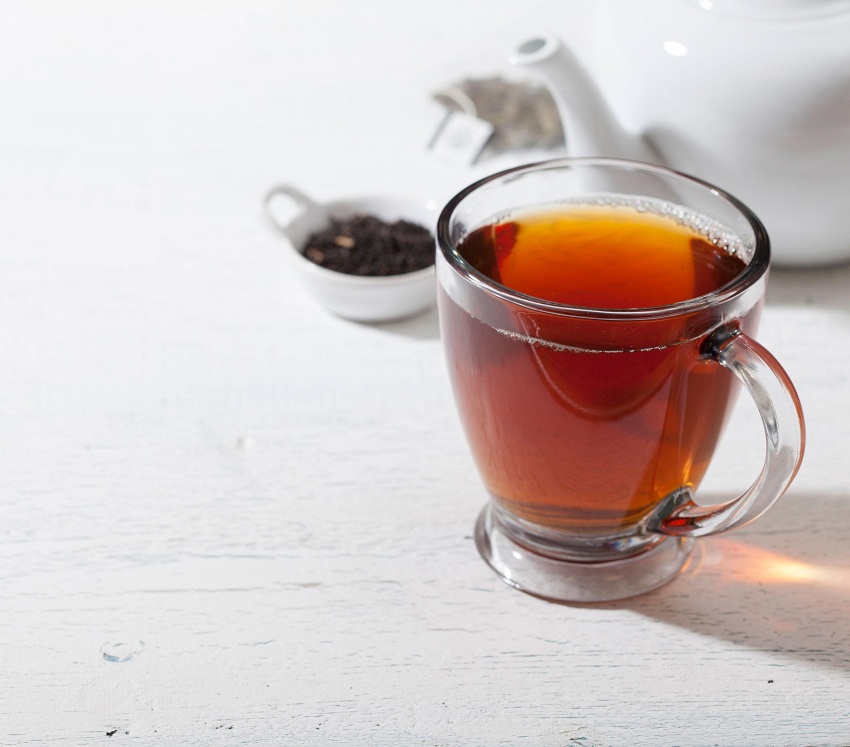
Black Tea
Black tea, belonging to the same group as the green, white and oolong teas is the most oxi
Read more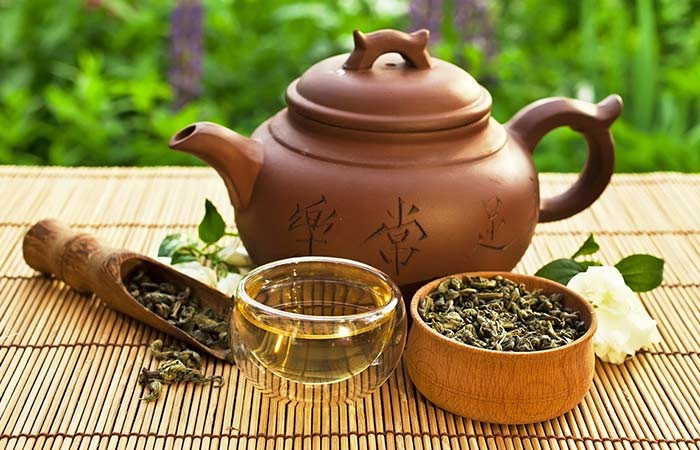
Oolong Tea
What is oolong tea Oolong, a traditional beverage of China, is prepared from the buds, st
Read more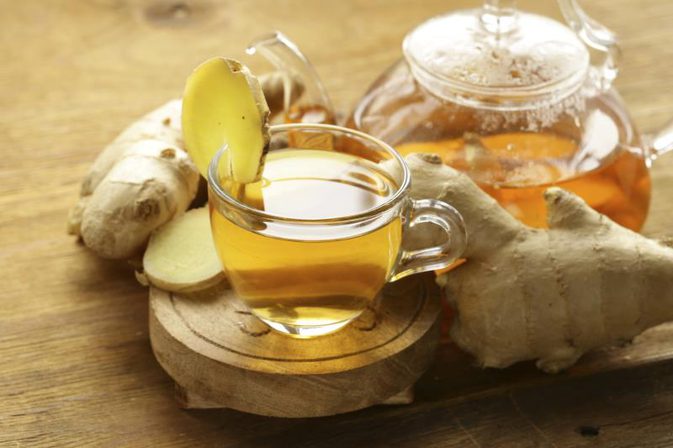
Ginger Tea
Ginger tea, prepared from the roots of ginger, is a popular herbal beverage of Asia. Becau
Read more
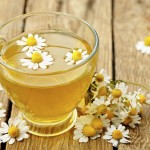

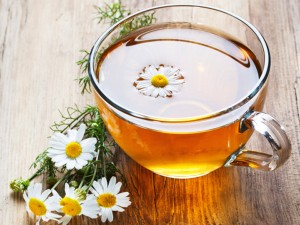
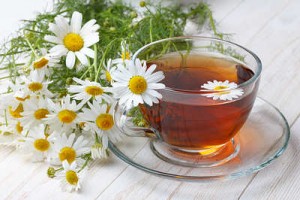
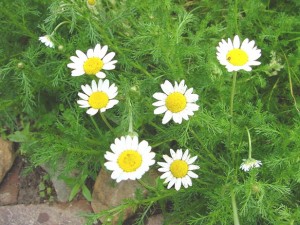
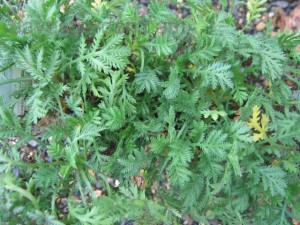
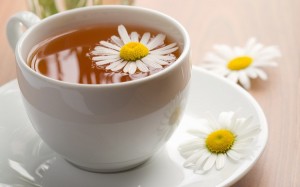
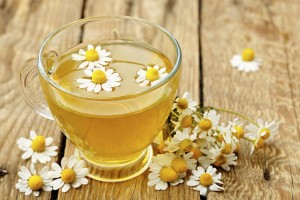
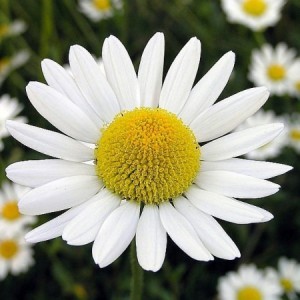
Why is there no list of side effects on the boxes of Camomile tea. When
it can be harmful to people suffering from a number of ailments that require them to take Blood thinning tablets like Aspirin etc. I have been troubled with Dry mouth and Dry skin since I started drinking the tea and only discovered tonight that Camomile tea is a major cause of
Those two problems.